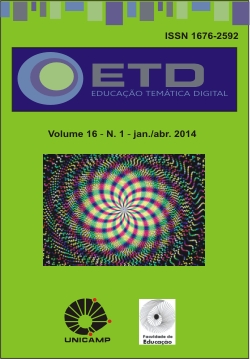Abstract
Information and communication technologies (ICTs) in our current networked society are a continuing and irreversible process. Therefore, consideration must be given to the construction of a new education and science model that takes into account complementary dimensions of content, form, and relationships between teachers and students. The aim of this study was to evaluate the impact of Design Thinking, PBL methodology and the use ICTs in school routine of the students from the graduate program in Ethics, Values, and Citizenship in School (EVC). The program was conducted in a blended learning format in which three collaboration technologies were experimentally used (BrainMerge™, TERF and Fishbowl™). At the end, we applied a survey to evaluate the use and impact of these technologies. From the 239 participants (second EVC) 96.8% affirmed that the EVC contributed to their learning routine. The first EVC, 142 participants indicated a similar response distribution, 94.4%. These results may indicate that EVC has a transformative impact on participants: while they prototype, they can see better approaches to solve school problems, they are changing their classes turning them into more interactive activities. The basic and higher education are not untouched by the socio-political economic transformations that the world has undergone. Education needs to re-invent to continue the prominent role that societies have granted it over the past 300 years. Paradoxically, this re-invention depends as much on its capacity for continuation as on its capacity for transformation, to adapt to the new demands of society, culture, and science.
References
ARAÚJO, Ulisses Ferreira de. A quarta revolução educacional: a mudança de tempos, espaços e relações na escola a partir do uso de tecnologias e da inclusão social. ETD – Educação Temática Digital, Campinas, v. 12, n. esp., p.31-48, mar. 2011.
ARAÚJO, Ulisses Ferreira de. Temas transversais e a estratégia de projetos. São Paulo: Moderna, 2010. 111 p.
ARAÚJO, Ulisses Ferreira de; SASTRE, Genoveva. Aprendizagem baseada em problemas no ensino superior. São Paulo: Summus Editorial, 2009. 236 p.
BEHAR, Patrícia Alexandra. Modelos pedagógicos em educação a distância. Porto Alegre: Artmed, 2009. 316 p.
BROWN, Tim. Design thinking: Uma metodologia poderosa para decretar o fim das velhas ideias. Rio de Janeiro: Elsiever, 2010. 272 p.
CASTELLS, Manuel. A sociedade em rede. 2. ed. São Paulo: Paz e Terra, 1999. 617 p.
COLL, César; MAURI, Teresa; ONRUBIA, Javier. Os ambientes virtuais de aprendizagem baseados na análise de casos e resolução de problemas. In: COLL, César; MONEREO, Carles. Psicologia da educação virtual: aprender a ensinar com as tecnologias da informação e comunicação. Porto Alegre: Artmed, 2010. p. 189-207.
FRUCHTER, Renate; YEN, Sam. RECALL in Action. In: ASCE ICCCBE CONFERENCE, 8., 2000, Palo Alto. Proceedings of... Palo Alto: Stanford, 2000. p. 1012 - 1021.
FRUCHTER, Renate. The fishbowl: degrees of engagement in global teamwork. Intelligent Computing In Engineering And Architect, Ascona, v. 4200, n. 1, p.241-257, jun. 2006.
INTERNATIONAL TELECOMMUNICATION UNION (Switzerland). Measuring the information society. Geneva: International Telecommunication Union, 2013. 233 p.
PLATTNER, Hasso; MEINEL, Christoph; LEIFER, Larry. Design thinking research: studying co-creation in practice (understanding innovation). Berlim: Springer, 2012. 300 p.
UNESCO. World conference on higher education: the new dynamics of higher education and research for societal change and development. Paris: UNESCO, 2009. 10 p.
The ETD - Digital Thematic Education uses the Creative Commons license (CC), thus preserving the integrity of the articles in an open access environment.

